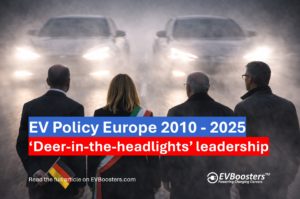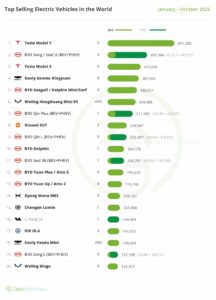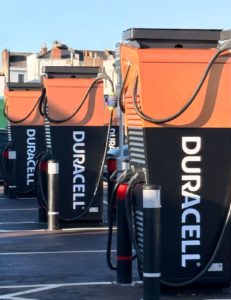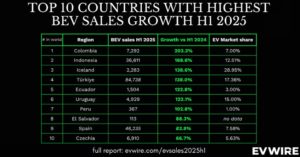BYD vs Tesla, 2025 the EV tipping point
More than just a clash of titans, this shift signals a seismic power change in global e-Mobility. BYD’s vertically integrated business model—controlling everything from battery chemistry to final assembly—gives it unmatched pricing power and agility. Its model lineup is broader, its cost base is lower, and its global ambitions are growing fast.
If nothing changes, BYD won’t just catch Tesla in 2025—it will pass it. And when it does, it won’t look back. So where does that leave the rest of the market?
As Tesla and BYD duel for dominance, a growing pack of challengers is carving out its own space in the BEV universe. From legacy players like Volkswagen and BMW to fast-rising Chinese brands like Geely, Changan and SGMW, the competition is getting sharper, smarter and more global by the day.
The analysis shows the top 20. To keep it short 🙂 We break down the top 10 best-selling BEV brands of 2024.
1. Tesla – 1.789.226 Units Sold (–1%)
Despite a slight decline, Tesla remains the top-selling BEV brand worldwide. Its global appeal and iconic status keep it in the lead—for now.
Top Models:
Model Y: The best-selling car globally, thanks to its efficiency, minimalist design, and strong resale value.
Model 3: Continues to perform well, particularly in North America and Europe.
Challenges: Tesla’s limited model diversity, slower innovation in new segments, and pricing pressure are slowing its growth.

2. BYD – 1.764.992 Units Sold (+12%)
A true powerhouse, BYD came within a hair’s breadth of taking the crown. With 12% growth in 2024, it’s poised to lead in 2025.
Top Models:
Dolphin (compact hatchback)
Seal (mid-size sedan)
Han (premium sedan)
Tang (SUV)
Strengths: BYD’s vertical integration, cost efficiency, and aggressive international expansion are accelerating its global rise.
3. Geely – 832.568 Units Sold (+58%)
Geely has emerged as one of the fastest-growing BEV brands, with a huge 58% year-on-year growth.
Top Models:
Zeekr 001
Zeekr X
Geometry A
Why it works: Geely combines modern design, technology partnerships (with Volvo and Polestar), and scalable platforms to deliver well-positioned electric cars for both local and international markets.

4. Volkswagen – 744.800 Units Sold (–3%)
VW holds strong in the top 5 but saw a slight 3% drop compared to 2023.
Top Models:
ID.4 (SUV)
ID.3 (hatchback)
Outlook: Volkswagen’s BEV transition is challenged by internal software issues and increasing price competition in Europe. Still, its global dealer network and brand recognition provide resilience.
5. SGMW (SAIC-GM-Wuling) – 625.000 Units Sold (+37%)
This joint venture dominates China’s budget EV segment with massive scale and affordability.
Star Model:
Hongguang Mini EV – an ultra-compact city car with huge popularity in urban areas.
Success formula: Ultra-low-cost mobility that unlocks electric driving for a new demographic.

6. BMW – 426.594 Units Sold (+14%)
BMW continues to see consistent growth in electrification, with a strong 14% boost this year.
Popular Models:
i4 (sporty sedan)
iX (premium SUV)
iX1 (compact SUV)
Why it’s growing: BMW offers a premium experience with high build quality, appealing to traditional luxury buyers going electric.
7. Hyundai – 396.573 Units Sold (+2%)
Hyundai remains stable in its EV strategy, showing a modest 2% growth.
Top Models:
IONIQ 5 and IONIQ 6
Highlights: Striking design, ultra-fast charging, and good value for money make Hyundai a consistent player in the global EV landscape.
8. GAC – 392.210 Units Sold (–20%)
GAC saw a notable 20% decline, reflecting the volatility of the Chinese EV market.
Known for:
Aion S and Aion Y
Issues: Fierce domestic competition and price wars have impacted sales. Still, GAC remains a top-tier Chinese player.
9. Changan – 300.000 Units Sold (+43%)
Changan had a strong 43% growth year, driven by local demand and new product launches.
Rising Models:
SL03 and UNI-K EV
Key drivers: Government incentives, production scale, and improved design make Changan a rising star in the Chinese EV market.

10. Stellantis – 275.000 Units Sold (–15%)
The multinational group behind Fiat, Opel, and Peugeot saw a 15% decline.
Notable Models:
Peugeot e-208
Fiat 500e
Challenges: The limited availability of competitive BEVs in North America and inconsistent EV strategies across brands are slowing momentum.
Trusted growth partner for EV Charging Companies since 2018
Since 2018, EVBoosters has been the trusted executive search partner for powering EV Charging Networks in Europe —helping them scale by recruiting the leaders and experts who drive real growth. If you’re a CEO, founder, or investor looking to strengthen your leadership team or critical senior position (sales/operations/product), we’re here to help.
Schedule your introductory call HERE with our founder and managing partner Paul Jan Jacobs and let’s explore how we can support your growth journey too.
Source: big shout out to JATO Dynamics (Felipe Munoz) for sharing this great analysis.







